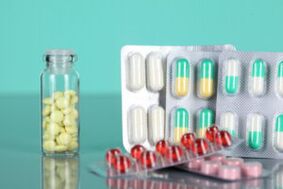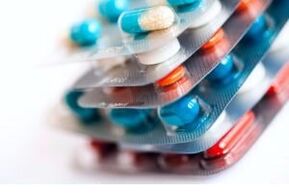Often, at the initial stage, doctors prescribe treatment for prostatitis with medication, when in men the inflammatory process in the prostate gland is diagnosed. In fact, the therapy is quite time consuming and time consuming. Prescription of medication is carried out only by a specialist on the basis of symptoms and diagnostic indicators.
How do we understand that there is inflammation of the prostate?
Inflammation of the prostate gland develops rapidly and you can learn about the disease when unpleasant symptoms appear:

- Reduction of sexual drive;
- Rapid onset of ejaculation;
- A constant feeling of fullness in the bladder;
- And the appearance of discomfort during bowel movements, painful sensations in the perineum;
- Uncontrolled sluggish start of erection;
- Discharge of urine into a thin intermittent stream;
- Constant fatigue for no reason;
- Increase the temperature to 41 degrees with the addition of bacteria.
It is important to determine the form of the disease, provoking the factors before starting treatment. For example, in case of stagnation and damage of harmful bacteria, treatment is done mainly with antibiotics to suppress the harmful microflora. The key to prostatitis is to choose the most effective medication.
Medications, release forms
Medical treatment of prostatitis involves many drugs, with different forms of excretion. But it is important to understand that one or the other form is prescribed taking into account the stage, form, types of development of the disease, existing symptoms and contraindications to its use.
Among all the known groups of drugs used:
- Solutions for installing microclysters to suppress the inflammatory process;
- Tablets, particularly antibiotics, as a form of medication to treat inflammation of the prostate gland;
- Rectal suppositories with direct action on affected lesions;
- Injections in injections as a rapid-acting form of medication to suppress the inflammatory process during prostatitis.
Many men complain of mental and nervous system disorders that require recovery. It is a prostatitis that comes to the stronger sex as a blow down the waist while the erection is drastically worsened and the potency is significantly reduced. Men start to be stressed, problems arise in the personal sphere.
Tranquilizers or antihistamines can be used to relieve swelling and inflammation, although dosages and courses of treatment can not be neglected to prevent side effects and to drastically worsen the situation. Also, many are wondering how to treat prostatitis in men with medication and what is better to take: pills or candles? The insertion of suppositories implies a proximity to the prostate gland. However, candles are safer, do not affect the stomach, open quickly in the rectum and pass through the bloodstream to the site of injury. The effectiveness comes after 20 minutes.
If you can no longer endure the pain, you can eliminate the problem of pills, however the joints enter the stomach and split into the liver when many of the beneficial substances have already lost their effect. The tablets are effective much later, after 40-45 minutes. Therefore, it is best to choose rectal suppositories for the treatment and prevention of prostatitis, prostate adenoma.
Prescribed medications
It is important to apply medication to suppress the source of the inflammatory focus.
Drugs are prescribed only by a specialist, taking into account the peculiarities of the inflammatory process, the type of disease, the degree and stage of development of prostatitis.

- Antibiotics are prescribed for the detection of pathogenic bacteria, the acute course of the disease with a course of therapy for 6 weeks - 2 months.
- Macrolides in the chronic course of the disease.
- Nonsteroidal anti-inflammatory drugs with direct action on the source of inflammation.
- Decongestants, pain relievers for excessive swelling of the prostate, painful urination.
- Hormonal agents by reducing erectile function to restore and normalize the endocrine system.
- Adrenergic blockers to normalize urinary outflow during urinary problems, to relieve inflammation and pain during urination.
- Rectal suppositories that act directly on the source of inflammation to prevent adverse processes. These are the safest medications that may not reduce liver and kidney function, but they do an excellent job of dealing with harmful microbes. Candles are an excellent addition to antibiotics to weaken the harmful microflora in case of weakened immunity, when strong antibiotics also kill the beneficial flora in the body. Candles are considered safer and more effective.
- Immunomodulators to boost local immunity.
- Muscle relaxants to relieve pain, to normalize blood flow to the prostate gland, to drain the drain completely.
- Pain relievers in the urethra, severe pain in the form of injections, release of tablets.
- Sedatives to restore the nervous system, increased arousal, relaxation. In many men, prostatitis obviously affects the psyche and does not affect the nervous system in the best way.
- Tranquilizers for pronounced mental disorders, to increase potency, normalize blood circulation and urinary process.
- Decongestant antihistamines to relieve swelling of prostate tissue.

On a note! Some tranquilizers cause addiction, so it is not recommended to disrupt the dosage and duration of administration. According to doctors, it is better to use liquid-form medications that act quickly on the source of the pain. Candles can be used in the form of enemas, when injecting the composition into the urethra quickly suppresses pain.
Only complex treatment will become more effective and recovery will be faster. In addition, the behavior of the course of physiotherapy and taking folk remedies at home will not be superfluous. It is understandable that if you do not start treatment with medication in time, the disease will quickly turn into a chronic stage. In the absence of an erection in the morning, obvious signs of impotence, pain in the lower abdomen, you should contact a urologist immediately. Without knowledge, you should not prescribe prostate medication independently with unknown medications, resort to lethal doses in an attempt to recover faster. So no relief will come, but other health problems and serious complications will appear.
ᲛImportant! Improper treatment can lead to serious consequences: adenoma, prostate cancer, transition to a chronic form of the disease
Which is more suitable: anti-inflammatory or antibiotic?

- If acute-course prostatitis is detected, then antibiotics from the fluoroquinolone group are recommended for use.
- If prostatitis has a chronic course, then it is advisable to take macrolides or tetracycline antibiotics.
- If non-bacterial prostatitis is detected, then antibiotic therapy may simply be ineffective. It is best to take anti-inflammatory drugs from a group of nonsteroidal anti-inflammatory drugs.
Attention! Short-term courses, including 1 week gap, are recommended when taking nonsteroidal anti-inflammatory drugs.
Which is better: candles or painkillers?
Rectal suppositories do not interact with the digestive system, liver and kidneys, so they are considered safer and are used to correct the treatment of prostatitis, relieve inflammation, pain and swelling, and to normalize urination.
It is advisable to use pain pills for severe pain, although uncontrolled use of analgesics can cause side effects and complications.
If there is pain in the perineal region, then it is preferable to take muscle relaxants to reduce muscle tone in the abdomen. Nonsteroids, which are best used in rectal suppositories, will help relieve swelling and pain. The best medicines are natural herbal products based on medicinal plants.
It is important to understand that if the inflammation of the prostate gland is caused by bacteria, then it is better to be treated with antibiotics, but to neglect the dosage and timing of treatment. Cure prostatitis, forget about the inflammatory process and edema forever, it means strictly following all the recommendations of specialists, timely use of medication and instructions.



































